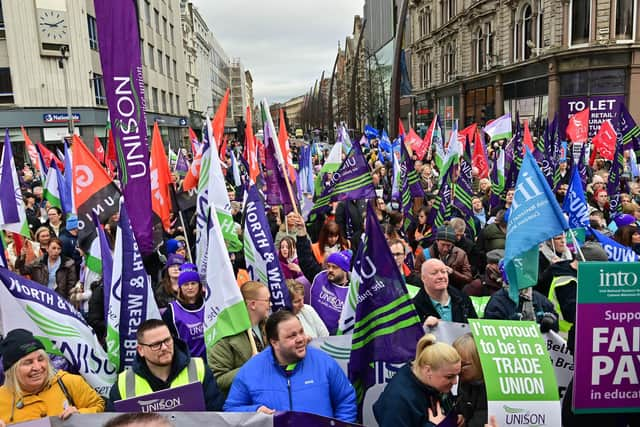Northern Ireland public sector staff angry over growing pay gap with rest of UK, unions warn; 'NI has become a poor place to work' says Unison chief
and live on Freeview channel 276
A number of unions have stated that further industrial action is likely this year if public sector pay awards for workers in England are not matched in Northern Ireland. On Thursday, more than one million public sector workers in England and Wales, including teachers, police and doctors were told they would be offered pay rises of up to 7%.
Decisions surrounding public sector pay in Northern Ireland are usually made by the Stormont executive, but it has not been functioning for over a year due to the DUP’s boycott in protest against post-Brexit trading arrangements. Many departments in the region have also cited significant budgetary pressures which have meant that previous pay offers in the rest of the UK have not been able to be matched. While the majority of the pay offers announced by Prime Minister Rishi Sunak this week will come from efficiency savings, any new money which would come to Northern Ireland through Barnett consequentials will also have to be used to pay off an overspend from previous years.
Advertisement
Hide AdAdvertisement
Hide AdHealth workers, teachers and some civil servants in Northern Ireland have been involved in industrial action in recent months amid ongoing disputes about wages and conditions. The Nipsa (Northern Ireland Public Service Alliance) union represents workers in a number of industries, including the civil service. General secretary Carmel Gates said workers in Northern Ireland were being punished and members are angry. She said: “So, because of the punitive budget that has been set by the Secretary of State in April, which means that any additional funding that comes to departments across the water won’t come here but will come off our so-called ‘debt’ means that workers here are, again, being penalised for issues that they’re not responsible for, for a cost-of-living crisis that they are not responsible for. So my members are very angry about the treatment.”


Ms Gates said all public sector unions would be discussing the possibility of taking industrial action in the autumn. “There is going to be discussion, there has to be discussion amongst all of the public sector unions here because although we are slightly different in terms of how we’ve been affected by the awards that have happened across water, essentially we are all in the same boat,” she said.
Unison Northern Ireland represents 40,000 members across health, social care, education and the voluntary sector. Regional organiser Joe McCusker said the announcement of the increase in pay for healthcare workers in England and Wales would more than double the pay difference for workers in Northern Ireland.
“As it stands today, health care workers across the health service in Northern Ireland are already being paid 5% less than their counterparts in other parts of the UK and this will increase with this recent announcement,” he said. “If the pay review bodies’ recommendations aren’t given to workers in Northern Ireland this will increase to around 10 to 12% paid less in Northern Ireland, and that is just unacceptable, contemptible, and it’s all unjustifiable.”
Advertisement
Hide AdAdvertisement
Hide AdMr McCusker also said that the pay disparity would cause healthcare workers in Northern Ireland to seek employment in other regions of the UK.
“We’re going to have people who are now looking at working in the NHS, other parts of the NHS in the UK because they are getting paid more,” he said. “We will have graduates coming out of university with nursing degrees and they are going to see that it’s best for them to go elsewhere to work rather than Northern Ireland.
“Northern Ireland has become a poor place to work.”
Justin McCamphill from the NASUWT said teachers were prepared to strike if they don’t receive the same level of pay as colleagues in England. He said: “Teachers in Northern Ireland will be looking at what has happened in England where they were offered 6.5% from September and that is on the back of 5% that they got this year. During the same time teachers in Northern Ireland haven’t got anything since September 2020, so they are asking the question why is their pay falling so far behind the pay of other teachers in the UK. Our members have made it clear to us that they are prepared to take strike action if teachers don’t receive at least the same level of pay as teachers in England.”
The Police Federation of Northern Ireland chairman, Liam Kelly, said any break with pay parity with the rest of the UK would be a massive blow to PSNI officers.
Advertisement
Hide AdAdvertisement
Hide Ad“As we know, the PSNI is having to deal with a deficit of £38 million and if we are to get a 7% award, it’s clear there will have to be significant financial intervention from Government,” he said. “At this stage, our officers are entitled to know if they are getting 7% or if, for the first time, there will be a break with pay parity.”